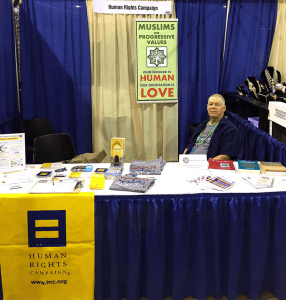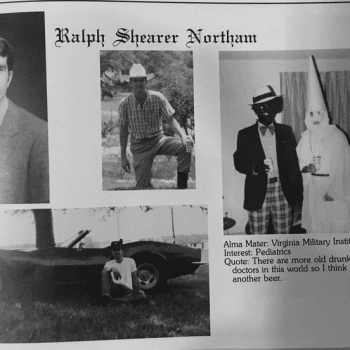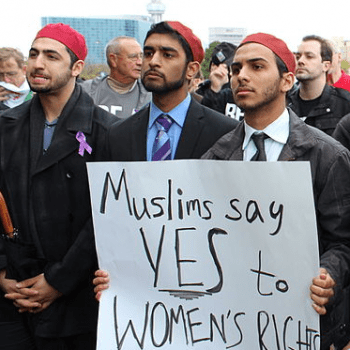The Public Religion Research Institute’s 2017 American Values Atlas, published last week, revealed that for the first time a majority of American Muslims support the legalization of gay marriage. It is a slim majority: 51% favor legalization while 34% reject it and 15% are undecided. But it’s a significant reversal from just three years ago when a Pew Research Center study found that 52% of the community rejected the legalization of gay marriage, 42% supported it, and 6% were undecided.
The American Values Atlas also revealed that nearly 60% of the American Muslim community believes that first amendment protections of religious freedom do not mean small business owners should be allowed to refuse service to gay and lesbian people on the basis of their personal religious beliefs.
Another recent study by the Pew Research Center revealed that attitudes about the social acceptance of homosexuality have undergone similar changes. 52% now say that society should accept homosexuality while only 33% say homosexuality it should be discouraged. By comparison, in 2011, only 39% of Muslims said homosexuality should be accepted; in 2007, just 27% held this view.
Muslims who are LGBT and their allies have a lot to celebrate. A lot has changed since I wrote about accepting Gay Muslims in 2007, or about Qur’anic Values as an inspiration for Gay Marriage back in 2008. In many ways it feels like we’re winning the war for people’s hearts and minds.
Winning the Civic Battle But Not the Religious One?
Unfortunately, more positive views on the legality of gay marriage and society accepting homosexuality do not necessarily mean that American Muslims have abandoned traditional religious viewpoints that homosexuality and homosexual acts are grave sins according to the Qur’an. Believing that society should accept gays does not necessarily equate to the view that God accepts them.
Despite an extensive search, I could find no survey that specifically asked American Muslims whether they believe homosexuality is a sin. All of the research on the American Muslim community focuses on LGBT legal or societal issues. Research on religous views regarding homosexuality in 36 Muslim majority countries shows that homosexuality is overwhelmingly viewed as a sin, with less than 0-10% saying it is morally acceptable.
Anecdotal evidence suggests that the situation in America may not be much better. Mosques across the nation are overwhelmingly hostile spaces for the LGBT community, and especially for LGBT Muslims. A resource guide for LGBT Muslims lists just six mosques in North America that are welcoming. And The Human Rights Campaign (HRC), which has only three supportive organizations on its list, says, “It is rare that an openly LGBTQ Muslim feels fully welcome at a mainstream mosque in the United States.”

Last year, representatives from HRC and Muslims for Progressive Values (MPV) manning a booth at the Islamic Society of North America’s national conventions were asked to leave and their booth was dismantled after protests by convention goers. According to Frank Parmir, from MPV, “they are very uncomfortable with MPV’s advocacy of gender equality and LGBTQ inclusion. They were very clear that they are a religious organization. (…) their religious values do not allow any suggestion that members of the LGBTQ community can be Muslim if they are not repentant. They are adamantly opposed to the notion that there is any room in Islam for a conversation about the possibility of any equality of legitimacy between heterosexual intimacy and homosexual intimacy.”
Speakers popular at national conventions like ISNA, the Muslim American Society, the Islamic Circle of North America, and Muslim Students Association, almost unilaterally condemn homosexuality as a sin, some even saying it is punishable by death.
American Muslims’ Growing Political Savvy
At the same time, many national Muslim organizations appear to have come to the understanding that it if Muslims want their religious freedoms protected, they need to protect the religious freedoms of all Americans; and if they want civil rights as Muslims they must support civil rights for all.
For instance, ISNA publicly and officially endorsed the Employment Non-Discrimination Act (ENDA) in 2016. But after intense criticism from the community, they clarified their position, stating:
The question ISNA asked itself was: Should an employer be allowed to terminate an employee for anything other than performance on the job that the employee was hired to do? For example, can the employee be fired for religious or cultural practices, such as wearing hijab on the job, or misbehaving sexually off the job? We support hijab on the job and we oppose misbehaving sexually off the job, but neither of these justifies being fired from the job. We were being asked to support the civil rights of employees to keep their jobs regardless of who they were and what they did with their lives, as long as they performed at the job as expected. We were not being asked to support or oppose any lifestyle practice or behavior.
The questions we asked ourselves were: Where do we draw a line between our moral values in terms of human rights and civil rights, and our moral values in opposing a particular lifestyle? Is it possible to support someone’s civil rights without endorsing their lifestyle? Should a secular society be able to impose religious values on its members? For example, do we support the right of a person to be an atheist, considering that the Qur’an says there is ‘no compulsion in religion’? If an association of atheists asks ISNA to support or to endorse legislation that prohibits discrimination against them in the work place, what would be our stand on that issue? What is the interest of the Muslim community in the long run regarding this issue?
We differentiate between someone’s lifestyle and belief system, and their right to express or believe whatever they would like to believe. At the same time, we defend and preserve our right to disagree with them in their lifestyle, and to engage them in debate with intent to persuade. Disagreement is different from discriminating against or depriving someone of a job.
It’s pretty clear. They think homosexuality is a sin, even they uphold your civil right to practice it.
Similarly, in a statement issued after Omar Mateen opened fire in a gay bar in 2016, a group of over 400 American Muslim organizations, community leaders and scholars stated:
While most American Muslims adhere to a strict Abrahamic morality, the Quran is clear that its injunctions apply only to Muslims who choose to follow them: “There is absolutely no compulsion in religion.” In America, individuals are at liberty to pursue happiness as each sees fit; it is our cherished political right. Those of us who live in this country, irrespective of our beliefs, must respect the equality of all Americans under the laws of the land.
Again, it’s pretty clear these organizations and individuals oppose homosexuality, but cherish our American civil liberties, and understand the importance of supporting everyone’s civil and human rights if you want those same rights and liberties for yourself.
A Glimmer of Hope
Still, after all the analysis. I have hope that things are changing. Just last year a Pew survey discovered that fully 64% of American Muslims believe there are more than one legitimate interpretation of Islam, and 52 percent believe that traditional interpretations need to be reevaluated. Even better, the majority (59%) of those who say religion is very important in their life also say there is more than one true way to interpret the faith, and 43% say traditional understandings should be reinterpreted.
I’m hoping those statistics translate into a growing acceptance of gay Muslims not just as “Muslims Temporarily Astray Until We Set Them Straight” or “Poor Beleaguered Souls Who Just Need To Practice Celibacy Even Though The Prophet Advised Against It” or “Muslims Who Can Change their Sexuality With Proper Education.”
I’m hoping that the conservative Muslims who support gay marriage on civil rights grounds grow into the understanding that love, committed and enduring, cannot possibly be haram. God could not be so cruel as to create people to love in a certain way and them condemn them for it. I’m hoping that arguing for equal service at the bakery and on the job translates into equal service in the masjid and the musallah.
And when they come looking for answers, for different ways to understand Islam, the Muslim LGBT community and I will be here to help them find the resources they need.











